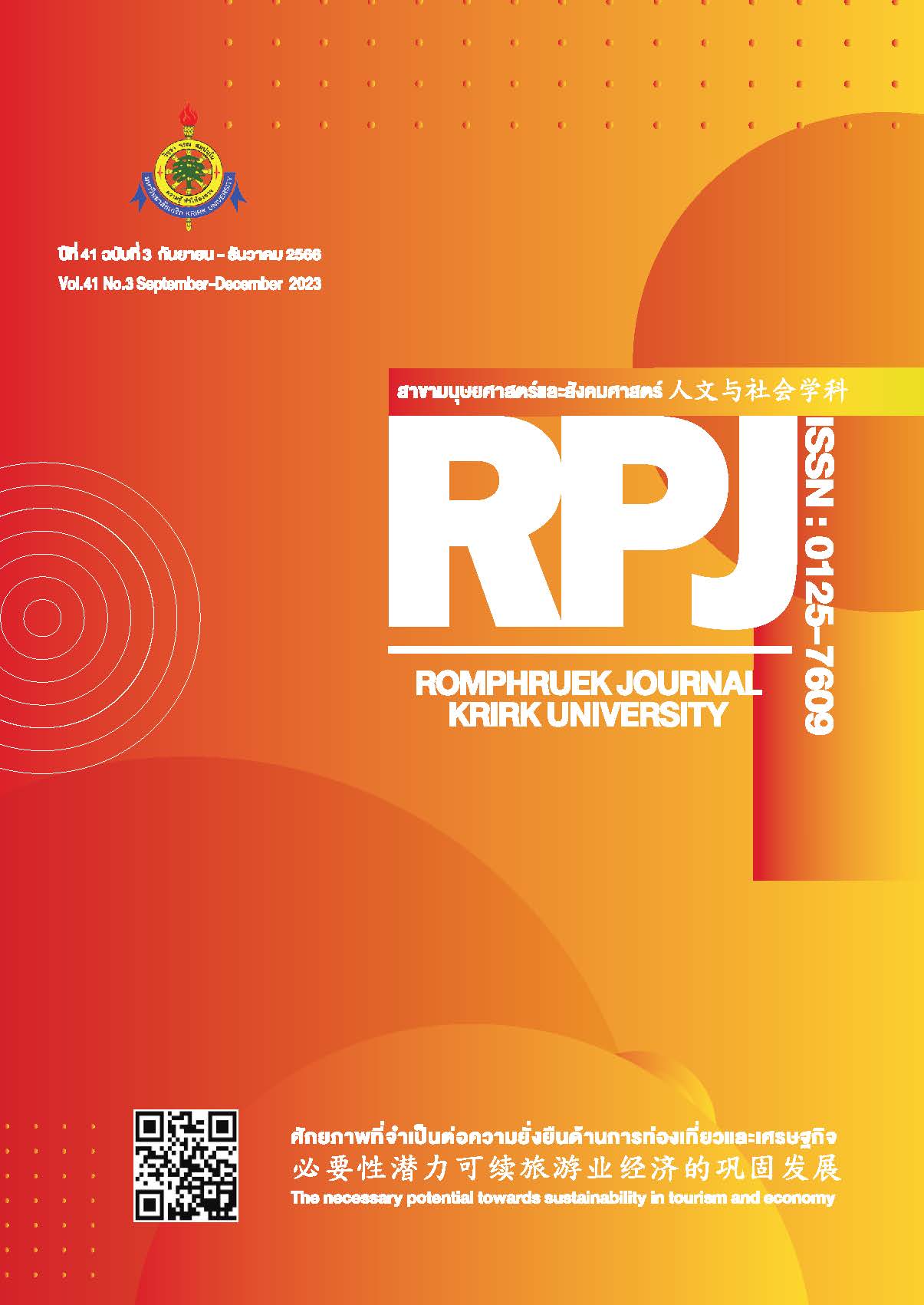Crisis Management : Reformed management Model
Main Article Content
Abstract
Crisis management is important in the reform period because it encourages collaboration and creative problem-solving as the organization is ready to prepare a crisis resolution plan. This allows executives to manage their time in managing crises quickly and to the point, taking action to minimize losses and reduce organizational problems as well as building confidence in the workplace for work achievement according to the goals. The key elements are 1) risk management, 2) strategic planning, 3) secure environment management, 4) leadership, 5) cost-effective resource management, and 6) effective communication.
Article Details

This work is licensed under a Creative Commons Attribution-NonCommercial-NoDerivatives 4.0 International License.
Every article published in the Romphruek Journal of the Humanities and Social Sciences is the opinion and point of view of the authors. Thery're not the viewpoint of Krirk University or the editored department. Any part or all of the articles for pablication must be clearly cited.
References
ฉัตรปวีณ์ จรัสวราวัฒน์. (2559). การบริหารงานในองค์กรในช่วงเหตุการณ์ที่วิกฤต. JOURNAL OF LANGUAGE, RELIGION AND CULTURE, 2(1), 108-113.
สมาคมการจัดการงานบุคคลแห่งประเทศไทย. (ม.ป.ป.). การจัดการภาวะวิกฤต. สมาคมการจัดการงาน บุคคลแห่งประเทศไทย. www.pmat.or.th › ความรู้ทรัพยากรบุคคล › gallery1.
Apuke, O. D., & Tunca, E. A. (2018). Social media and crisis management : A review and analysis of existing studies. LAÜ Sosyal Bilimler Dergisi, 9(2), 199– 215.
Brockner, Joel & James, Erika Hayes (2008). Toward an Understanding of when Executives See Crisis as Opportunity. The Journal of Applied Behavioral Science, 2(44), 94–115.
Bundy, Jonathan; Pfarrer, Michael D.; Short, Cole E. & Coombs, W. Timothy (2017). Crises and Crisis Management: Integration, Interpretation, and Research Development. Journal of Management, 43(6), 1661–1692.
Coombs, W. T. (1999). Ongoing crisis communication: Planning, managing, and responding. Sage Publications Inc.
Eke, E. C., & Eke, J. K. (2020). Strategic planning and crisis management styles in organizations: A review of related literature. Journal of Strategic Management, 5(1), 36–46.
Fener, T., & Cevik, T. (2015). Leadership in crisis management: Separation of leadership and executive concepts. Procedia Economics and Finance, 26(5), 695–701.
Fragouli, E., & Ankunda, C. (2016). Leadership, crisis management and business sustainability: A case study. The Business and Management Review, 8(2), 107-127.
Goldman, S. B., & Traverso, D. K. (1997). Don’t look now, but you are having a crisis. Risk Management, 3(14), 42-47.
Mitroff, Ian I.; Gus Anagnos. (2000). Managing Crises Before They Happen: What Every Executive Needs to Know About Crisis Management. Amacom.
Nojoumi, A. R., Givehchi, S., & Zadeh, A. M. (2015). Crisis management arising from technological risks and its models in south pars: A systematic review. Journal of Materials and Environmental Science, 6(7), 1965–1974.
Padhan, R., & Prabheesh, K. P. (2019). Effectiveness of early warning models: A critical Padhan, review and new agenda for future direction. Buletin Ekonomi Moneter Dan Perbankan, 22(4), 457–484.
Pollard, D., & Hotho, S. (2006). Crises, scenarios and the strategic management. process.Management Decision, 44(6), 721–736.
Savelides, S., Mihiotis, A., & Koutsoukis, N.S. (2015). Crisis management for secondary education: A survey of secondary education directors in Greece. International Journal of Educational Management, 29(1),18–43.
Seeger, M. W.; Sellnow, T. L.; Ulmer, R. R. (1998). Communication, organization and crisis. Communication Yearbook, 3(21), 231–275.
Smith, Larry & Dan Millar, PhD. (2002). Before Crisis Hits: Building a Strategic Crisis Plan. Washington. AACC Community College Press.
Stern, E.K. (2017,17 May). Crisis Mana. gement. https://www.cambrigde.org.
Taneja, S., Pryor, M. G., & Zhang, L. (2010). Crisis management: A strategic and tactical leadership imperative for organisational sustainability. International journal of Sustainable Strategic Management, 2(1), 60–73.
Ulmer, R. R.; Sellnow, T. L.& Seeger, M. W. (2006). Effective crisis communication: Moving from crisis to opportunity. Sage Publications.
Verma, R., & Sehgal, V. K. (2016). Implementation of Information System in Crisis Management Using Modeling and Simulation. International Journal of Simulation–Systems, Science & Technology, 17(32), 122-132.
Wooten, Lynn Perry & James, Erika Hayes (2008). Linking Crisis Management and Leadership Competencies: The Role of Human Resource Development. Advances in Developing Human Resources, 10(3), 52–379.


